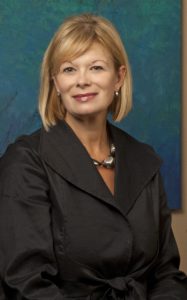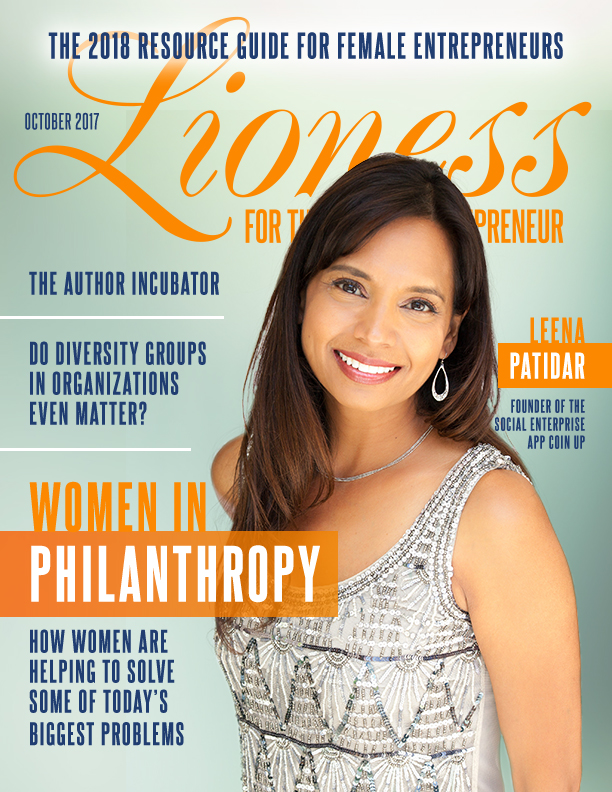Cover star Leena Patidar is the founder of Coin Up.
By Zubia Abbasi
Change agents have been using philanthropy to impact the world for ages. With the onslaught of social enterprises, entrepreneurs could merge their business desires with their inclination to pay it forward.
This month, Lioness caught up with a few women who are using their careers to raise the bar and help solve some of the biggest issues of our time.
The Philanthropic Consultant

Angela E. White, CEO at Johnson, Grossnickle and Associates, said her path to philanthropy began when she was encouraged by her college president to donate as a student. After graduating, in 1986 White was hired as the Development Officer for her alma-mater and with further connections, she was able to transition to the Lily School of Philanthropy where she also taught a non-degree course on women donors.
Through her intensive research, White discovered that women were in control of major financial decisions, whether it was purchasing gifts, healthcare, education, technology or making other purchasing decisions in a married household.
White said women hold three essential factors of giving, “Time, Talent, and Treasure.” She explained that more women are attaining higher education, and the fact that women tend to live longer than men has provided them with the resources and drive necessary to become a major group in the market.
White said there is no particular difference in the giving of men and women when it comes to disaster relief, and both groups tend to give generous sums since disasters naturally create a spike in philanthropic efforts.
However, she mentioned that there are differences in ways of giving according to generation gaps in women. Gen X and Millennials tend to earn their own money, and so they have more control and decision-making power in choosing where to spend their wealth. On the other hand, Baby Boomers and the Silent and Great generations tend to have inherited their wealth and so they hold a guardianship stance over it. This manifests in spending their wealth on a charity that the family has always supported and or saving that wealth for the next generation.
Women Give, the signature research report of the Women’s Philanthropy Institute, focuses on gender differences in charitable giving. Their 2016 report focused on giving in young adulthood, gender differences and the changing patterns across generations. For example, “long-term trends have shown an increase in the number of households headed by single women, an increase in the age of first marriage, and a growing tendency to never marry. Women’s participation in the labor force has risen, leading to their increased influence in financial decision making individually and within households.”
Because of this, in a piece titled, “12 Insights into Women’s Philanthropy,” by White for the website, Donor Search, she urged nonprofits to stop ignoring this untapped resource.
“It is time nonprofits accept that they simply cannot afford to ignore this influential audience. I hope you will use these tips to better engage women to help you advance your mission,” White wrote.
The Social Entrepreneur
Leena Patidar, founder and CEO of the app, Coin Up, said, “84 percent of millennials give, but they need a way to bridge because their way of giving is incrementally.”
Coin Up is the first “officially approved mobile donation app’ on the Apple app market. It emerged as a digital version of loose change savings, catering to anyone willing to give. Patidar called it “spare change in a jar gone digital.”
Coin Up aims to create a platform that allows nonprofits to spend less time raising money and more time executing their missions. By empowering both nonprofits and donors with a simple tool, they hope to bring about ongoing, sustainable, and life changing impact at local, regional and global levels.
The app allows its user to pick a charity of their choosing and decide on a monthly donation amount affordable for each individual’s budget and goals. This allows maximum freedom to give as they please, without resorting to collect a large sum of money at a single moment. Coin Up generates a profit on 15 percent of each transaction made to charity organizations by the donor.
Coin Up was created because Patidar, an entrepreneur for 15 years who was also working as a CFO consultant, saw a need.
“I saw a lot of waste happening and thought about what I could do with an entrepreneurial perspective, and incorporate that with my consulting from a social impact perspective,” Patidar said.
She said the need for Coin Up was confirmed when she visited India, her parents’s home country, and saw the devastating state of children on the street who had a lack of basic needs. Her desire to create an opportunity for those children eventually led her to create Coin Up.
This year she received the “2017 Start Up Tech of the Year” Pinnacle Award from Athena San Diego for her work. She encourages other women to take action.
“If you have a great idea, and its right, you can always go back to school, because there is a risk-benefit ratio you have to look at. But if you fell that you have something, then go for it,” Patidar said.
She is preparing to launch the android version of the app by next year.
The Charitable Foundation CEO

Another philanthropic organization that has been working tirelessly to live up to the expectations and needs of both its donors and community is the Community Foundation of Western Massachusetts. It is a public nonprofit foundation catering to the changing needs of the community since it was formed in 1991.
The Community Foundation administers a charitable endowment consisting of nearly 600 separately identified funds ($121 million) serving three counties bordering the Connecticut River in western Massachusetts (Hampden, Hampshire, and Franklin counties).
Katie Allan Zobel is the President and CEO of the foundation. She has been with the organization for 12 years and previously co-held the title of vice president. She said that she agreed that “women tend to drive the charitable making decisions in families” and her experience in philanthropy as a young woman dates all the way back to the early nineties when she wrote a grant that allowed her to get paid to teach a writing class in the county jail. She recognizes that social entrepreneurism is changing philanthropy and she doesn’t think it’s for the worst.
Earlier this year in an op-ed for The Republican, Zobel wrote that, “Business, government and philanthropy can and must work together. Each sector can leverage its own strengths, partnering with others to identify the good ideas and fund them. We will need data and technology to understand better what works and to change what doesn’t. We will need all that, plus local knowledge and expertise.”
Whether it’s consulting and collecting data, creating an app to virtualize the way we donate pocket change, or managing an organization that provides for the needs of a community, it’s clear philanthropy has been made that much better by the presence of these women.
 Zubia Abbasi is a senior Creative Writing major, at Western New England University. She loves to tell stories and believes in the importance of representing the unheard. She hopes that one day she can inspire someone to take the leap and draw creative inspiration from whatever kind of life they have been dealt.
Zubia Abbasi is a senior Creative Writing major, at Western New England University. She loves to tell stories and believes in the importance of representing the unheard. She hopes that one day she can inspire someone to take the leap and draw creative inspiration from whatever kind of life they have been dealt.







Add Comment